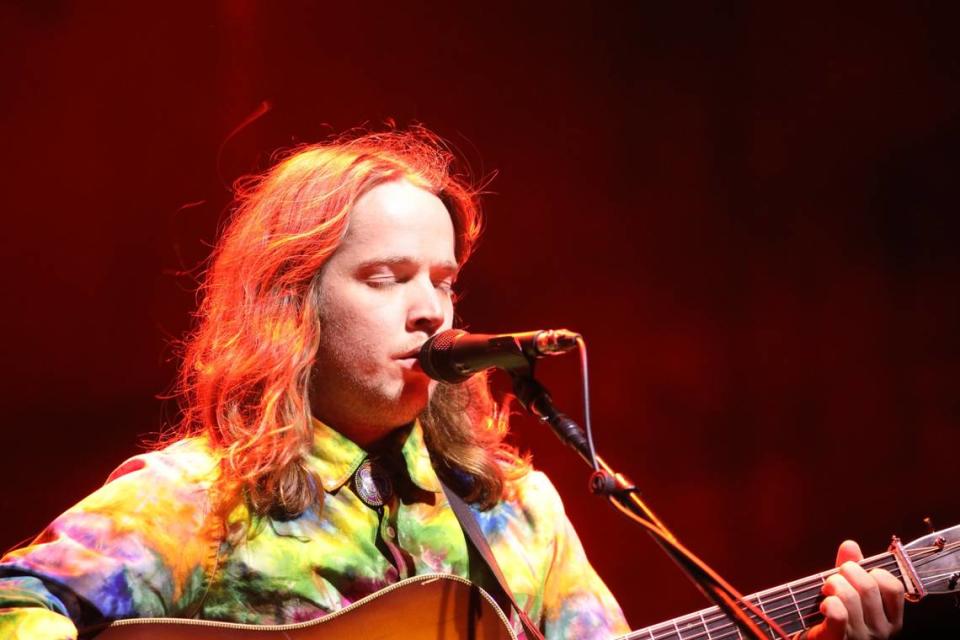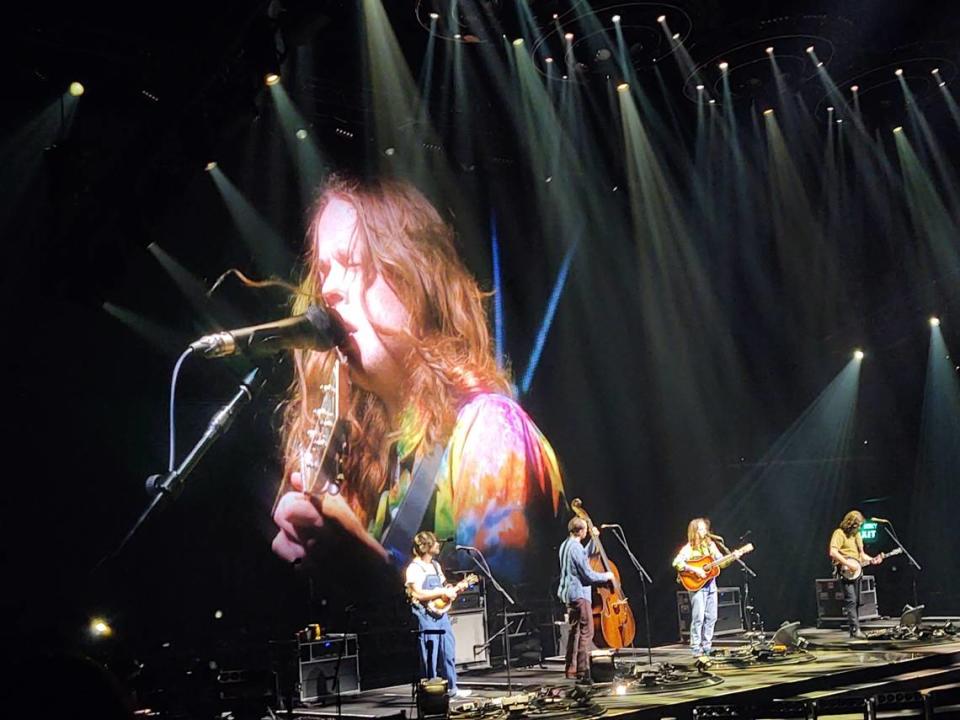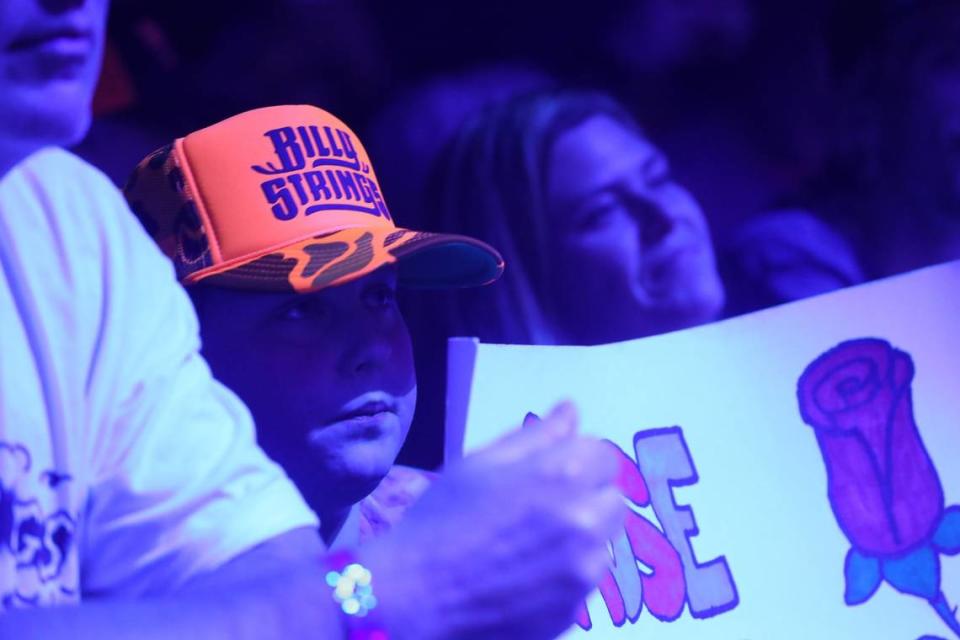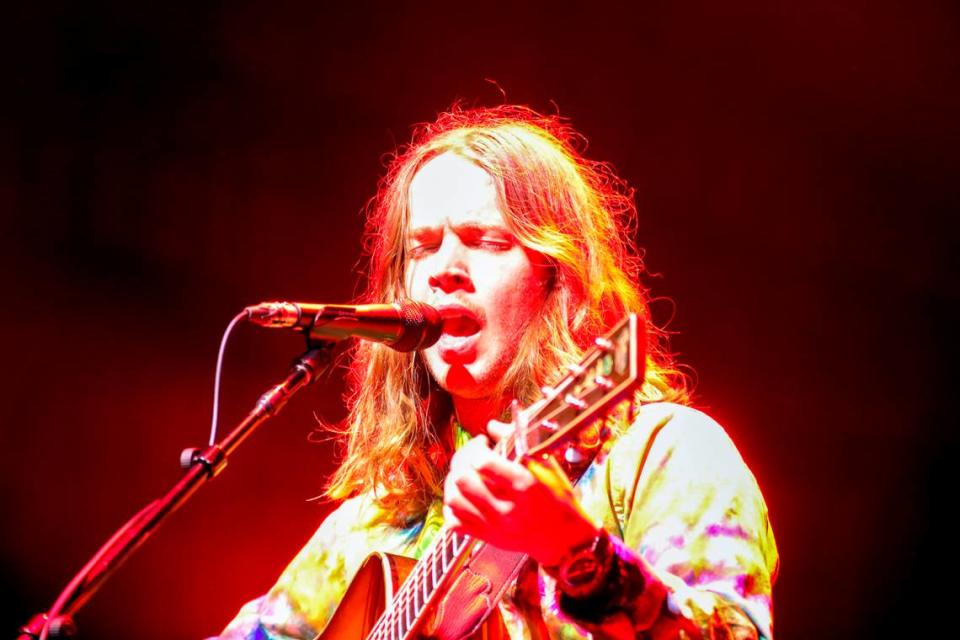Review: Billy Strings’ Rupp Arena concert proved he’s here to serve bluegrass music
As the second of his two ferocious sets headed into the home stretch Friday evening, Billy Strings and his band gathered around a single microphone and uncorked the instrumental fire and vocal merriment at the heart of Bill Monroe’s “Uncle Pen.” The tune is a primer for bluegrass music bands. You sorta can’t trust a string music artist who doesn’t know how to bring it to life onstage.
But this performance was different. It was played like a rallying cry for the first of two sold out Rupp Arena concerts with a crowd that was dancing as though it was witnessing the second coming of the Grateful Dead. It was a predominantly young audience, too — at least part of which, one might safely assume, was hearing the live rites of the great Monroe for the first time.
Even Strings remarked how wonderful a moment it was after the song concluded. He had every reason to be thrilled. The tune — and, indeed, the entire performance (which did not include an opening act) — reaffirmed the 31-year old guitarist and singer as a generational talisman for bluegrass music. All his credentials were displayed in abundance, led by a scholarly command not just of tradition, but also of the advances forged by the music’s stylistic successors. Through the course of the performance, Strings and company covered, in addition to their own stirring material, music penned or popularized by The Stanley Brothers, The Delmore Brothers, Jimmy Martin, Doc Watson, Larry Sparks, Jerry Reed, Béla Fleck, Danny Barnes and, in at least three instances, Monroe. The euphoric crowd likely didn’t realize it was being presented with a history lesson, but it got one all the same.


The magical part of it all, though, was that Strings proved he was no revivalist. Sure, the drummer-less, five-man, all-acoustic troupe was keen enough on the music’s heritage to whip through Monroe’s “My Rose of Old Kentucky” in impromptu fashion after seeing a sign from the audience requesting it. But Strings was equally ready to set the traditional garments aside at times, crank up the pedals and echo effects and make his acoustic guitar roar with the psychedelic blues boldness of Mike Bloomfield and rock majesty of Carlos Santana.


Sometimes the song choice dictated such electricity, like a version of the very un-grassy “Crown of Thorns,” a tune cut in the late ‘80s by Seattle grunge merchants Mother Love Bone. That downshifted the band into darker, more pensive territory before the skies brightened with Fleck’s “Tentacle Dragon (Revenge of the)” a work Strings cut in 2021 with the banjo great that balanced ample sums of bluegrass’ sunny melodic disposition with a progressive hardwiring that bordered on jazz.
In fact, the biggest joy of the show centered on how often (and how easily) Strings leapt from tradition to innovation. The show-opening “Hellbender,” a Strings original which managed to reference Kentucky in its opening line, was largely indistinguishable from the traditional material. All the right boxes were checked: a storyline of personal disparity, a vocal command of stoic and assured urgency and room enough for Strings and his warp-speed playing to crash the sound barrier.
Billy Strings did it again. Historic night of bluegrass at Rupp Arena. pic.twitter.com/O8EiuLKTyq
— twobourbon (@twobourbon) April 27, 2024
But the entire band brought plenty to the table, including the fat, jazz-like runs continually served up by bassist Royal Masat, the broad fiddle vocabulary of Alex Hargreaves and the instrumental thrill-seeking of banjoist Billy Failing and mandolinist Jarrod Walker, both of whom proved to be Strings’ most tireless sparring partners of the night. Strings himself even retreated from guitar duties briefly to begin the show’s second set with a playful reading of the folk favorite “Crawdad Song” on solo banjo.
The latter wasn’t the evening’s most stirring unaccompanied selection, though. That came near evening’s end when Strings, his band dismissed and his guitar set aside, delivered an acapella version of “And Am I Born to Die,” an 18th century hymn perhaps best known to bluegrassers through a late ‘70s version by Doc Watson. All scholarly sentiments were laid bare here in a simple, wildly powerful recital by an artist known for his instrumental daring, but here proudly serving as part of the choir forever in service to the bluegrass muse.
Billy Strings
Where: Rupp Arena, 430 W. Vine
When: April 27, 7:30 p.m.
Tickets: $49.50-$69.50 through ticketmaster.com.
